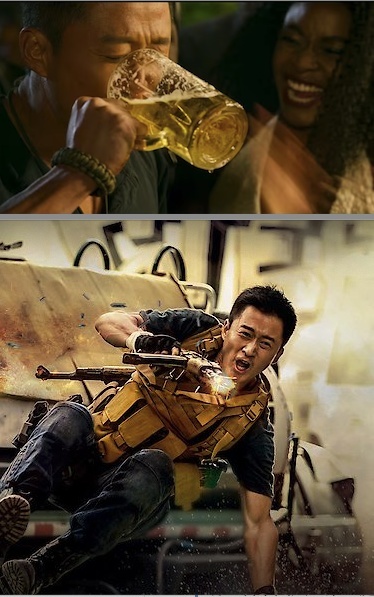Chinese Communist Party's nuclear arsenal (Video screenshot)
[People News] On August 28, Xinhua News Agency published the list of 26 foreign heads of state and government leaders attending the September 3rd military parade. The list revealed that Western countries were collectively absent. In response, overseas netizens on the X platform mocked, saying, “Not a single developed country,” “they’re all here for the money,” calling it a “Beggar’s Sect Conference.” Looking at today’s global wars and conflicts, it’s not hard to see that the leaders attending the parade are not only “Beggar’s Sect members” but also mostly from politically unstable countries, war zones, or places plagued by long-term disputes. The September 3rd parade was more like a “gangster gathering.”
1. Gang Members Fuel Global Instability
Countries attending the parade included:
-
Russian President Vladimir Putin
-
North Korean leader Kim Jong Un
-
Cambodian King Norodom Sihamoni
-
Vietnamese President To Lam
-
Lao General Secretary and President Thongloun Sisoulith
-
Indonesian President Prabowo Subianto
-
Malaysian Prime Minister Anwar Ibrahim
-
Pakistani Prime Minister Shehbaz Sharif
-
Belarusian President Alexander Lukashenko
-
Iranian President Pezeshkian
-
Cuban President Díaz-Canel
-
Myanmar Acting President Myint Swe
These countries are not only economically backward and dependent on Chinese Communist Party (CCP) aid but also repeatedly cause trouble, contributing to regional and global instability.
Examples cited:
-
Russia–Ukraine War – Since Russia’s full-scale invasion of Ukraine in February 2022, fighting has settled into a WWI-style stalemate with artillery and drone attacks. On August 15, 2025, Trump and Putin met in Anchorage, Alaska, raising hopes of a ceasefire.
-
Cambodia–Thailand Border Conflict – Armed clashes broke out July 24, 2025. Despite a ceasefire agreement on July 28, both sides continue to accuse each other of violations.
-
Myanmar Civil War – Since the 2021 coup, armed conflict between opposition groups and the military regime has continued unabated.
-
Pakistan – Ongoing Taliban violence and long-term domestic instability.
-
Israel–Iran War (2025) – Broke out in June, officially ended June 24 with U.S. mediation. Heavy casualties and losses on both sides.
-
Armenia–Azerbaijan Conflict – Decades of war over Nagorno-Karabakh. In August 2025, peace was brokered under Trump’s second term.
-
Congo–Rwanda Conflict – Long-running disputes; on June 27, 2025, Congo (DRC) and Rwanda signed a peace agreement under U.S. mediation.
Ironically, most of the warring parties Trump has mediated with are exactly the leaders who showed up at Beijing’s parade. Netizens joked: “Everyone Trump wants to meet is at the September 3 parade.”
2. The CCP Becomes a Global Money-Laundering Syndicate
According to Up Media (Aug. 28), the U.S. Treasury said Chinese money-laundering syndicates have moved around $312 billion through American banks and financial institutions to aid Mexican cartels and other criminals. Officials say Chinese laundering networks have become dominant in the illicit finance industry, serving cartels like CJNG (Jalisco New Generation Cartel) and Sinaloa Cartel.
From 2020 to 2024, over 137,000 suspicious activity reports were filed, linking Chinese laundering rings not only to drug trafficking but also pig-butchering scams, human trafficking, and medical fraud.
Because of Chinese capital-control laws, CCP citizens cannot freely transfer money abroad. This fueled underground brokers, who launder cartel cash through shadow dollar markets. As demand grew, these brokers colluded with cartels and gambling crime groups. Macau has long been a hub for such laundering.
-
Case in point: Alvin Chau (a.k.a. “Wash Rice Hua”), founder of Sun City Group (2007), built a massive cross-border gambling and laundering empire. Many CCP elites used Macau casinos to launder money abroad. In 2024, he was sentenced to 18 years and fined HK$24.8 billion. Rumors tied his fall to Jiang family interests, suggesting Xi used the case to cut off rival elites’ financial channels.
Analysts say this shows the CCP doesn’t fight crime per se—it just monopolizes it, pushing underground markets into the hands of Party princelings.
In 2019, The Wall Street Journal reported that Chinese “underground banks” had overtaken Colombian and Mexican networks as the top laundering option for cartels, using trade fraud, crypto, and Chinese community cash swaps.
From 2020–2023, the U.S. Treasury repeatedly sanctioned Chinese individuals and firms tied to cartel money-laundering. With fentanyl flooding the U.S., suspicions have grown that China’s laundering networks are not just private groups but backed by CCP elites.
3. From Civilized Nation to Gang Boss
For 5,000 years, Chinese civilization flourished, earning respect through culture, etiquette, and prosperity. But under Xi Jinping, China has veered from this tradition.
The so-called “red second generation”—Xi’s cohort—were born in the Cultural Revolution, steeped in violence and chaos. Their worldview was shaped by control and struggle.
As a result, China’s global image has shifted. Instead of attracting others through culture and civilization, Beijing now projects power like a gang boss—bullying neighbors, demanding submission abroad, and enforcing authoritarian control at home.
This transformation not only erodes China’s soft power but also intensifies global fear of the CCP’s strategic ambitions. The Cultural Revolution’s darkness should have been a cautionary tale, but Xi has written it into China’s future.











News magazine bootstrap themes!
I like this themes, fast loading and look profesional
Thank you Carlos!
You're welcome!
Please support me with give positive rating!
Yes Sure!